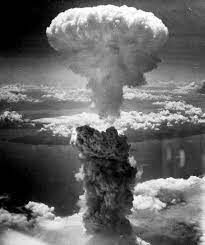Health
The Madness of Nuclear Threats
Russia’s war may be unwinnable. Will Putin attempt a "limited" nuclear strike?
Posted March 12, 2022 Reviewed by Gary Drevitch

I know that the sun will rise every morning and set every evening of my life. At least, I hope so and have no concerns. I know that the small town I live in is safe from a Russian invasion. If Putin put a puppet government in Mexico, I would not be so sure. And if I were living almost anyplace in Europe, I would know that I am not as safe as I was yesterday
Americans wake each morning without the slightest thought of whether or not a neighboring state will invade, rape, plunder, or take over their freedoms. But they do have other irrational fears.
This week’s news advances the specter of a nuclear war
We read the local headline news to learn about increased threats relating to nuclear weapons. As they continue, we slowly divide our thoughts between indifference and fear. On the one hand, a nuclear threat cannot affect us, and on the other—the subconscious one—maybe it could. In speaking to people in my small community, I've learned that too many have limited impressions of what nuclear weapons are capable of and of how threats of their use mess with our mixed and muddled anxieties.
How much does the average American know about the A-bombing of Hiroshima and Nagasaki? I put that question to 12 adults and four teenagers. Everyone knew about the bombings, but few could tell me anything clear about human suffering. When I asked about an approximate number of dead, the answers ranged from 1,000 to 25,000. Teenagers believed the numbers were less than 5,000. The actual count is between 130,000 and 215,000. When I asked about destruction, the answer was that probably a large number of buildings were destroyed. “How large?” I asked. “Oh,” one teenager said, “a hundred.”
Every house within almost two miles was destroyed.
Just one nuclear weapon
Few Americans alive today know the extent of obliteration the A-bomb caused. “Little Boy” dropped and exploded in mid-air on Hiroshima, creating a blast equal to 12-15,000 tons of TNT, destroying five square miles of the city. Today, the tiniest tactical nuclear weapon is capable of destruction far worse than what happened in Hiroshima. The use of a single nuclear weapon today—the smallest one—could vaporize the entire city of Kyiv and its population of almost 3 million. One nuclear bomb dropped in the relatively desolate area between Odessa and Uman would spark a nuclear war between Russia and the West. No nuclear attack would end with one.
A small tactical nuclear weapon?
Even if just one "small" nuclear weapon were to be launched in the current conflict, there would not be enough therapists in the world to deal with the human mental health trauma that would come from watching the aftermath in real-time.
Tadatoshi Akiba, a former mayor of Hiroshima, wrote in The Mainichi, one of Japan’s most respected major daily newspapers, that when Vladimir Putin “signaled the potential use of nuclear weapons” he escalated the fear that a nuclear war was on the table. Just the threat is a violation of international law.
We cannot know when or how this war will end; however, Putin's unprovoked attack against a peace-loving nation has already caused inexcusable death and destruction, and a major humanitarian crisis. His nuclear-weapons blackmail has already created a costly mental health problem for an enormous population. Americans are now waking and paying attention to the map of Ukraine as they realize that the Ukrainians are fighting for us as well as for themselves.
Mayor Akiba does not like to talk about international politics or military affairs unrelated to effective means of nuclear weapon elimination. With Putin’s threat, though, he feels that he must use his voice to tell us that the current crisis in Ukraine brings the issue of politics and warfare to the forefront of his advocacy to ban all nuclear weapons. An accidental mishap with just one tactical nuclear weapon could lead to—as we have been hearing from the Pentagon—another world war, this time an all-out nuclear war that would level the earth and bring on a nuclear winter lasting centuries.
Long-term mental health issues
We are emerging from a pandemic that has already hit our children and friends with long-term mental health issues. Now, we are entering a new news cycle of anxieties that could be far worse. When my grandchildren come home from school talking about another world war, I know it is the beginning of new anxieties that could upend any relief from two years of Covid abnormalities of life.
We are now witnessing new colonialism in real-time. Much has changed since an atomic bomb was dropped 77 years ago. With cameras and phones everywhere and bombs far more powerful than Little Boy, the misery and destruction from one nuclear weapon would be unimaginable. Just to see it in real-time would throw the psyche into a tailspin of such confounded emotion that it would take years to recover, if ever.
Putin is trapped in an unwinnable war and is not likely to permit himself to be a loser; so, he will resort to more destructive weapons just like he did in Syria. His threat might have been just a scare tactic. If so, Russia cannot justify its stockpiled nuclear arsenals as deterrents. When a country threatens to use a nuclear weapon in an unprovoked war, that nullifies the deterrent justification of possessing nuclear weapons.
We might think the damage a single nuclear weapon can inflict is so horrible that even a threat to use them could not be credible. Do we feel that a "limited" nuclear strike (whatever that could mean) is not credible? Either way, massive fear is generated because a threat with unclear meaning always induces anxiety.




